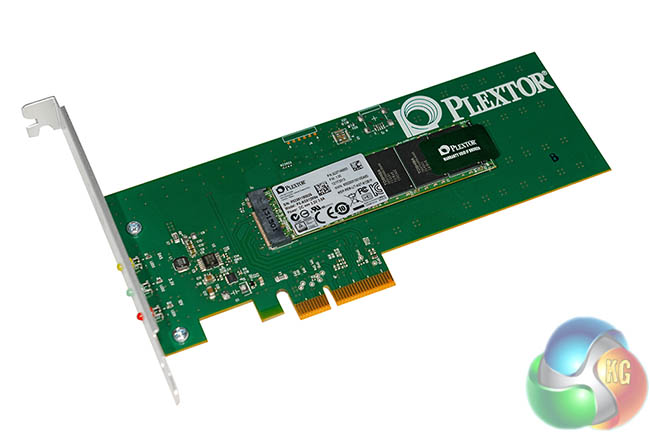
Solid State Technology has been dropping in price steadily for the last year and today we look at the latest product from Plextor – the M6e, a PCI express solid state design. This product is designed for the enthusiast audience who demand the fastest speeds possible. The M6E incorporates the latest generation Marvell 88SS9183 flash controller with multiple cores for ultimate performance when dealing with intense tasks. Unlike similar solutions which we have reviewed in the past, the M6e is automatically recognised as an AHCI device, requiring no additional drivers. Is this the high performance solution you should be shortlisting this year?
It doesn't seem that long ago that we were analysing the first batch of mainstream Solid State Drives, hitting peaks of 280 MB/s via the SATA 3 GB/s interface. To accommodate faster drives we subsequently moved to the SATA 6 Gb/s interface, doubling speeds to a theoretical maximum of 600 MB/s. Obviously there are some bandwidth overheads involved across the interface so the fastest solid state drives have been limited to around 560 MB/s.
If you don't want to utilize several 2.5 inch Solid State drives in a Raid 0 configuration then buying a PCI Express Solid State product may be the quickest way to achieve performance higher than the SATA 6 GB/s interface will allow.

The new Plextor M6e uses advanced 19nm Toggle NAND flash memory chips from Toshiba. It will be available in three sizes – 128GB, 256GB and 512GB.
| 128GB | 256GB | 512GB | |
| DRAM Cache | 256MB DDR3 | 512MB DDR3 | 1GB DDR3 |
Plextor rate the 512GB unit which we are reviewing today at maximum speeds of 770 MB/s read and 625 MB/s write.
| 128GB | 256GB | 512GB | |
| Sequential Read Speed | Up to 770 MB/s | Up to 770 MB/s | Up to 770 MB/s |
| Sequential Write Speed | Up to 335 MB/s | Up to 580 MB/s | Up to 625 MB/s |
| Random Read Speed (IOPS 4K) |
Up to 96,000 | Up to 105,000 | Up to 105,000 |
| Random Write Speed (IOPS 4K) |
Up to 83,000 | Up to 100,000 | Up to 100,000 |
Plextor have said that the 512GB M6e delivers maximum random IOPS performance of 105,000 read and 100,000 write. Random IOPS performance is rated at 94,000 read and 80,000 write.
Pricing looks to be competitive, and while the M6e is not yet available in the United Kingdom, the company informed us that three versions will be available between now and March. Prices range from £1.03 per gigabyte to 82 pence per gigabyte. Plextor are able to drop the cost per GB if you opt for the 256GB or 512GB versions.
Launch prices:
128GB – £132 (£1.03 GBP/GB)
256GB – £215 (£0.84 GBP/GB)
512GB – £419 (£0.82 GBP/GB)
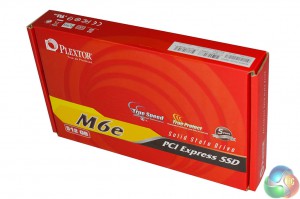
The Plextor M6e arrives in a bright red box with the product name highlighted in yellow on the front.
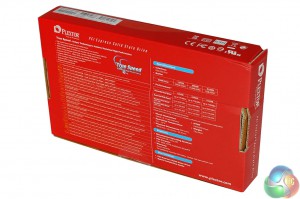
The rear of the box lists specifications of the product, along with others in the range.

Inside, Plextor include literature on the product, including installation instructions. They also include a ‘VIP' card, which opens up to detail product registration alongside the download of the Plextool SSD Utility.
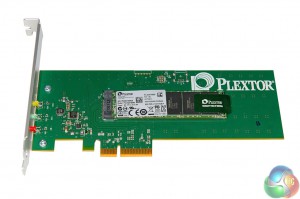
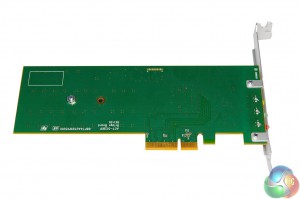
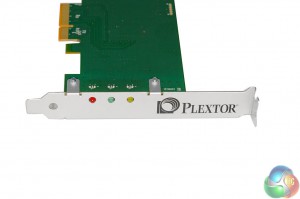
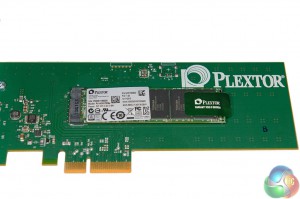
The Plextor M6e drive measures 180.98 mm x 121.04 mm x 22.39 mm and weighs 72 grams. Shock resistance is rated at 1500G, a 1 msec half sine.
The Plextor M6e series solid state drives are based on Toshiba's second generation multi level cell (MLC) NAND flash memory, made using 19nm process technology with toggle DDR interface. It is powered by the Marvell 88SS9183 flash controller with multiple cores for efficient performance. The M6 series solid state drives use Plextor's new proprietary ‘TrueSpeed' technology that ensures long term performance stability and effective multi-tasking. They also support Adaptive Write, which is Plextor's next generation proprietary firmware technology designed to maintain SSD performance under heavy workloads for the life of the drive.
Plextor rate the life of the unit at 2,400,000 hours, or a full 5 years.
On this page we present some super high resolution images of the product taken with the 24.5MP Nikon D3X camera and 24-70mm ED lens. These will take much longer to open due to the dimensions, especially on slower connections. If you use these pictures on another site or publication, please credit Kitguru.net as the owner/source. You can right click and ‘save as’ to your computer to view later.
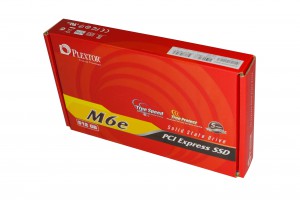
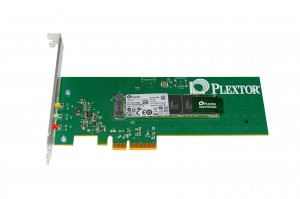
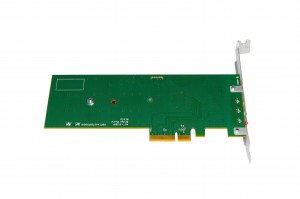
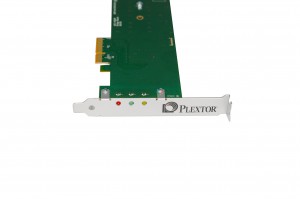
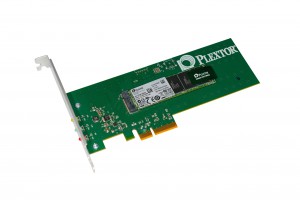
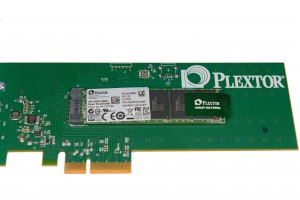
For testing, the drives are all wiped and reset to factory settings by HDDerase V4. We try to use free or easily available programs and some real world testing so you can compare our findings against your own system.
This is a good way to measure potential upgrade benefits.
Main system:
Kitguru Test Rig 2
Other Drives
Samsung Evo 1TB
OCZ Vector 150 240GB
ADATA Premier Pro SP900 128GB
Visiontek Racer Series 120GB
OCZ Vertex 4 512GB
OCZ Vertex 4 128GB SSD Review (firmware 1.4 update)
Transcend SSD720 128GB
Kingston SSDNow V+200 90GB
OCZ Octane 512GB (V1.13 fw)
Mach Xtreme MX-DS Turbo 120GB
Corsair Performance Pro 256GB
Samsung 830 Series 512GB
Patriot Pyro SE 240GB
Patriot Wildfire 240GB
MemoRight FTM Plus 240GB SSD
Patriot Pyro 120GB SSD
OCZ RevoDrive 3 x2 480GB
Patriot Wildfire 120GB SSD OCZ Agility 3 240GB
OCZ Vertex 3 240GB
OCZ Vertex 3 MAX IOPS 240GB
ADATA S511 240GB
Intel 510 120GB
Corsair F100 100GB
OCZ Vertex 2 120GB
Crucial Real SSD C300 64GB
MemoRight FTM.25 115GB SSD
Samsung SpinPoint F3 1TB
PCIe drives test system:
OCZ RevoDrive Hybrid 1TB HDD/SSD &
OCZ RevoDrive 3 x2 480GB
Software:
Atto Disk Benchmark
CrystalMark
AS SSD
PCMark 8
IOMeter
All our results were achieved by running each test five times with every configuration this ensures that any glitches are removed from the results. Trim is confirmed as running by typing fsutil behavior query disabledeletenotify into the command line. A response of disabledeletenotify =0 confirms TRIM is active.
Installing the M6e is a straightforward process. Every motherboard will be laid out differently, but we are using our PC Specialist Kitguru Test Rig 2 for this specific review today. This system uses the ASUS Maximus VI Hero Z87 motherboard.
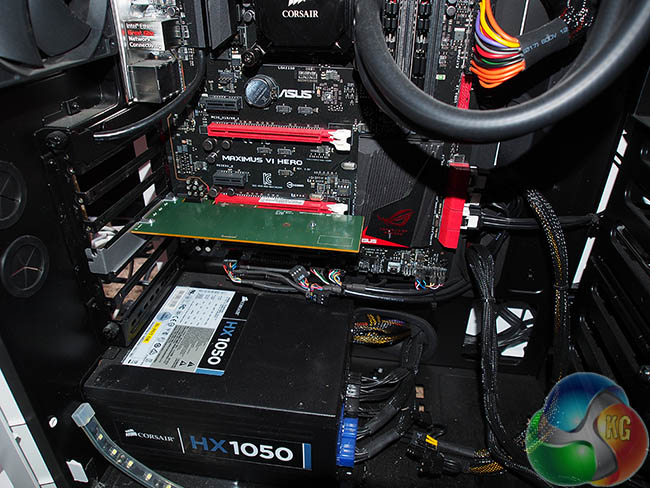
The image above shows the Plextor M6e PCI Express 512GB SSD installed in the lower of the two PCI e slots on this ASUS board. We then installed a graphics card in the top slot.

Windows 7 64 bit Enterprise immediately detected the Plextor M6e PCI Express SSD on first post. No need for drivers or complex install procedures.

476GB is highlighted as free to the operating system on first post.
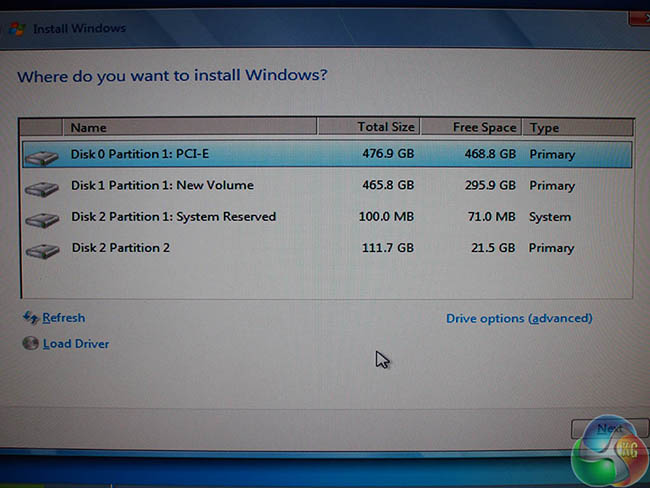
We rebooted the system to see how difficult it would be to configure the PCI Express SSD up as a boot drive.
We inserted our Windows 7 64 bit disc and went through the procedure for installing the operating system. The PCI-E drive was immediately detected as Disk 0 Partition 1, without any need for a messy driver install. The operating system installed within 15-20 minutes and we were ready to test. This really could not be any more straightforward.
Boot performance was 1 second better (faster) than the Samsung 840 EVO 1TB SSD, which is one of the best boot drives we have tested in recent months.
Crystalmark is a useful benchmark to measure theoretical performance levels of hard drives and SSD’s. We are using V3.0.1 x64.

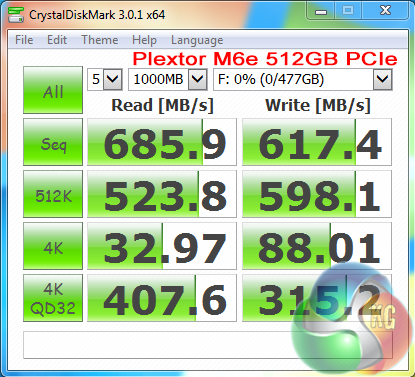
4K QD32 performance is exceptionally strong, averaging right at the top of our chart under the RevoDrive 3 and the Intel 520 drives in Raid 0.
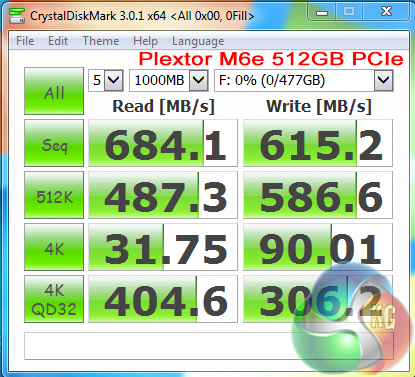
The Marvell controller is equally impressive when dealing with compressible data. Very strong results in both tests.








Above, some included compares from other leading solid state drives which we have reviewed in the last year.
The ATTO Disk Benchmark performance measurement tool is compatible with Microsoft Windows. Measure your storage systems performance with various transfer sizes and test lengths for reads and writes. Several options are available to customize your performance measurement including queue depth, overlapped I/O and even a comparison mode with the option to run continuously. Use ATTO Disk Benchmark to test any manufacturers RAID controllers, storage controllers, host adapters, hard drives and SSD drives and notice that ATTO products will consistently provide the highest level of performance to your storage.
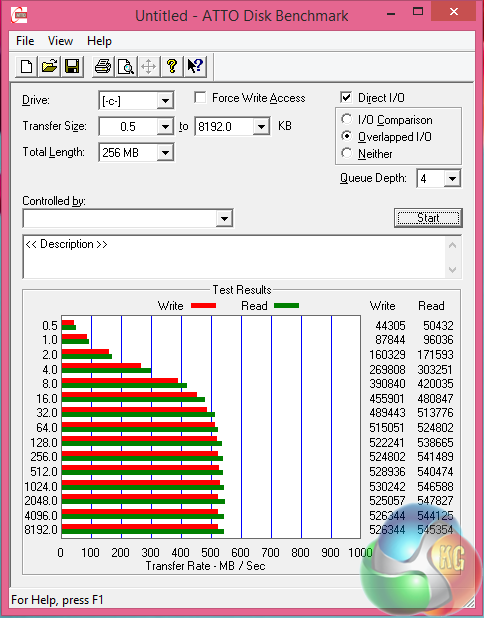
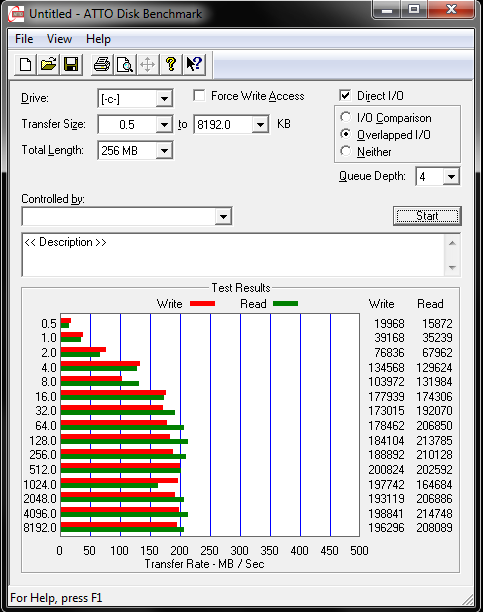
The Plextor M6e PCI Express 512GB SSD scores right at the top of our chart, peaking at 770 MB/s read and 690 MB/s write. Write performance is actually better than Plextor's 625 MB/s claims for the 512GB drive.








Some comparison results from other leading products available on the market today.
AS SSD is a great free tool designed just for benching Solid State Drives. It performs an array of sequential read and write tests, as well as random read and write tests with sequential access times over a portion of the drive. AS SSD includes a sub suite of benchmarks with various file pattern algorithms but this is difficult in trying to judge accurate performance figures.
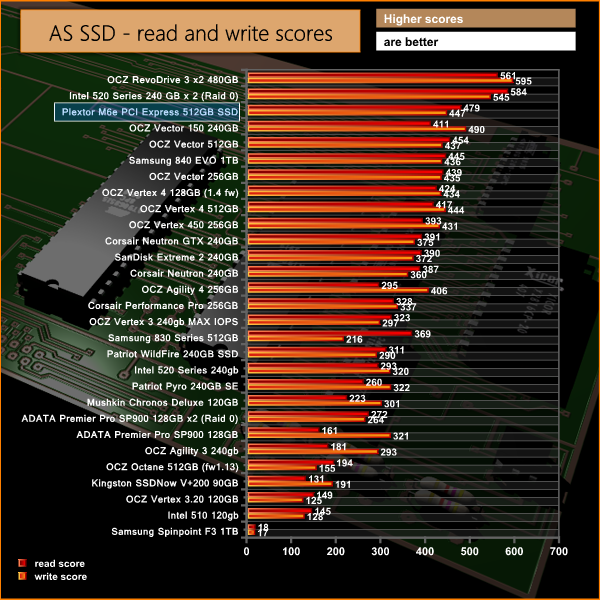
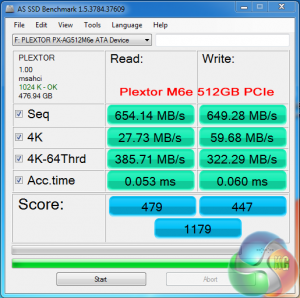
AS SSD only deals with incompressible data. This shows the strength of the Marvell controller in the Plextor M6e PCI Express 512GB SSD. The drive rates right at the top of our performance chart.
Some other comparisons from leading manufacturer drives, which we have tested in recent months.
PCMark 8 is the latest version in our popular series of PC benchmarking tools. Improving on previous releases, PCMark 8 includes battery life measurement tools and new tests using popular applications from Adobe and Microsoft. Whether you are looking for long battery life, or maximum power, PCMark 8 helps you find the devices that offer the perfect combination of efficiency and performance for your needs.

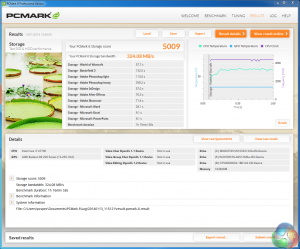
Overall performance in PCMARK8 is very strong, with a final score of 5,009 points.
IOMeter is another open source synthetic benchmarking tool which is able to simulate the various loads placed on hard drive and solid state drive technology.

We test with both random read and write 4k tests, as shown above. There are many ways to measure the IOPS performance of a Solid State Drive, so our results will often vary between the manufacturer’s quoted ratings.
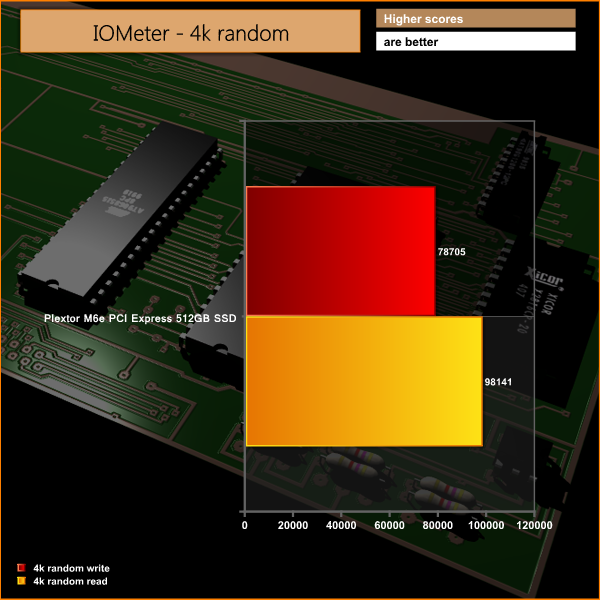
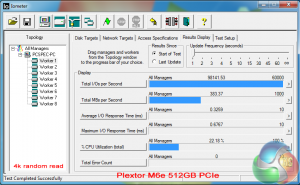
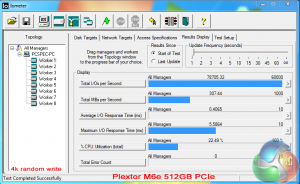
IOPS performance is very strong. We use our own testing methodology for the results. The 4k random read results are some of the most impressive we have seen in the last year rating at almost 100,000.
The Plextor M6e PCI Express 512GB SSD has certainly left a positive impression after many days of stress testing. A substantial portion of the enthusiast userbase have been wary of adopting a PCI Express drive as many we have reviewed in the past have required messy driver installs and firmware updates.
The Plextor M6e PCI Express is one of the easiest high performance solid state drives to install. Simply plug into a free PCI Express slot and start the system … it proved that simple to get going. In Windows 7 the M6e was immediately detected and it mounted as an F drive with 476GB of data storage available.
If you want to use the M6e as a boot drive, restart, insert your Windows install disc and install, just as you would if you were installing the operating system on a SATA connected Solid State Drive. No need to locate drivers for the Windows system disc to detect the M6E.
There is no doubt that the combination of Marvell 88SS9183 flash controller and 19nm Toshiba Toggle NAND flash memory chips is potent. Performance with both incompressible and compressible data was class leading and the Plextor M6e rated at the top of our charts, throughout the review.
Sequential performance is excellent, peaking at 770 MB/s read and 690 MB/s write, well beyond the technical limitations of the SATA 6Gbps interface. IOPS performance is also noteworthy with the drive producing a 98,000 4k random read result. If you have demands for this drive in corporate database intensive environments, then it will noteably outperform the majority of Solid State Drives we have reviewed in the last year.
Previously PCIe based Solid State storage solutions have been prohibitively priced, alienating a large segment of the potential audience. Before going to press Plextor informed us that the 512GB version of the M6e will cost only 82 pence per gigabyte. Retail price will be £419 for the 512GB unit we reviewed today. If this is too rich for your blood, then the 256GB drive will cost £215, and the 128GB drive will cost £132.
If you want an ultra fast boot drive, or desire greater performance than the current batch of SATA 3 drives can deliver then we feel the Plextor M6e PCI Express 512GB SSD deserves some serious consideration.
Discuss on our FACEBOOK page, over here.
Pros:
- Breaks the SATA 3 bandwidth bottleneck of 600 MB/s
- IOPS performance.
- no drivers, simply plug and play.
- excellent boot drive option.
- Ideal for a boot drive or large storage drive for video editing.
- equally good with compressible and incompressible data.
- frees more SATA ports for storage.
Cons:
- May not be suitable for people with multiple video cards.
Kitguru says: Extremely high performance, and at 82p per GB it offers good value for money too.

 KitGuru KitGuru.net – Tech News | Hardware News | Hardware Reviews | IOS | Mobile | Gaming | Graphics Cards
KitGuru KitGuru.net – Tech News | Hardware News | Hardware Reviews | IOS | Mobile | Gaming | Graphics Cards










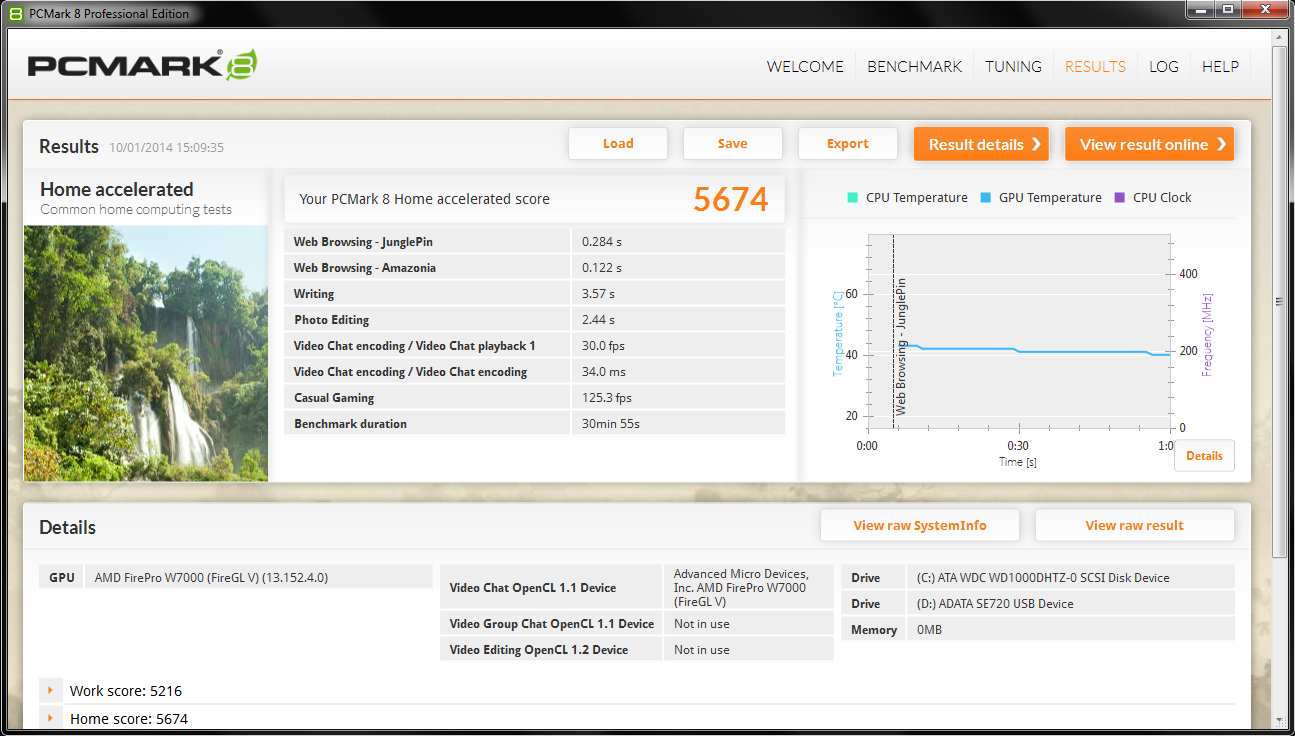
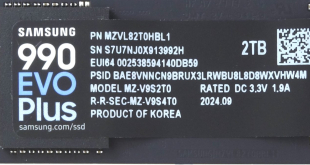
Well I am glad to see this, I had a revodrive for 4 months and it was the most unreliable piece of crap I have ever owned. OCZ went out of business for a reason 🙁 This seems well priced too. watching for a store link!
Its a good price really, If you want this performance you need to RAID 0 two budget 256GB drives, lose 2 SATA ports – which I would rather have for my mechanical storage drives. I like it.
The article states the test was performed on an Asus P8P67 Deluxe motherboard, but the one depicted is a Maximums VI. Could you clarify which platform it was?
Apologies John, there was a paragraph of text which should not have been there on the methodology page. it was tested on the Maximus, the Kitguru Test rig, which is sold by PCSPECIALIST. (same as the image shown).
Thanks for the super-speedy answer Zardon, and for the clarification. Was wondering if an older platform would constrain the performance or distort possible expected performance for end users, glad to see that was not the case. Much appreciated.
Apologies for what might be a silly question, would it be worth it price-wise if I got a low end SSD and held out for SATA Express or got one of these and kept it for a while after SATA Express came out, would it be worth it and would the performance be okay even after?
Hi Richard, it all depends on how much you want to spend. A low end SSD right now is very inexpensive, whereas this M6e will be more expensive. As we said, the M6e is faster than any SSD you can get right now, due to limitations of the SATA interface. To be honest however, most people would be happy with a standard, cost effective SSD running via a SATA 6Gbps port.
I’m bottlenecking at the moment on a mechanical hard drive, I think I’ll get a mid range SSD and wait for SATA Express but maybe something will happen through the year. Thanks for the fast response 🙂